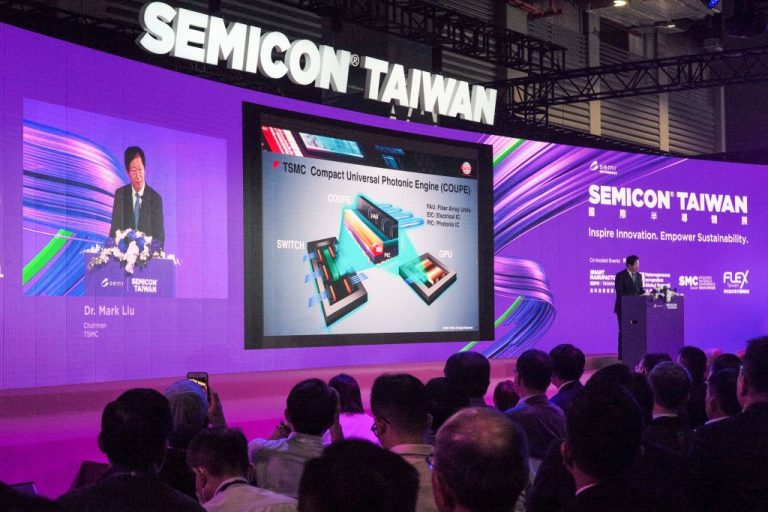A high-profile business delegation of 19 UK firms attended the 2023 SEMICON fair in Taiwan, underlining Britain’s ambitions to play a world-leading role in semiconductor materials, design, and research.
Taiwan has become a global hub for semiconductor manufacturing. The Britsh seek to explore opportunities and partnerships for trade, investment, and research and development (R&D) collaboration in Taiwan.
“The UK’s participation in SEMICON Taiwan this year comes following the recent publication of the UK’s National Semiconductor Strategy in May, highlighting the UK’s strength in compound semiconductors, R&D, and IP and chip design,” the handout of the U.K. government reads.
According to the statement, “19 British businesses will be demonstrating their innovative design, software, types of equipment, and materials at SEMICON Taiwan, representing a fraction of what the UK semiconductor sector has to offer.”
Professor Julia Sutcliffe, Chief Scientific Adviser (CSA) at the UK’s Department for Business and Trade (DBT), who led the first ever UK Semiconductors business delegation to the SEMICON event, which kicked off in Taipei on Sept. 6, said in a statement that she is “delighted to be leading the first-ever UK semiconductors business delegation to Taiwan.”
Success
You are now signed up for our newsletter
Success
Check your email to complete sign up
“Taiwan has a comprehensive semiconductor ecosystem comprising design, foundry, assembly, and testing facilities and a vast network of suppliers and vendors,” Sutcliffe continued. “The UK is a world leader in new and emerging semiconductor materials, design and IP, device research, and design automation.”
READ MORE:
- Taiwan Should Destroy its Semiconductor Industry if Beijing Invades: US Study
- UK Government ‘Quietly’ Permits Chinese Takeover of Britain’s Largest Semiconductor Plant
- China Faces Potential Disruptions to Semiconductor Industry, Ignores Biden Administration Warnings
- China Buys UK’s Largest Semiconductor Firm, Raising National Security Concerns
In the wake of the event, the deputation would also attend a Research and Development (R&D) forum hosted by ITRI in Hsinchu.
ITRI is one of the two Taiwanese parties that, in 2020, entered a memorandum of understanding (MoU) with a British player in the semiconductor market, Catapult. The other MoU was agreed on between the Taiwan Department of Industrial Technology, MOEA, and Innovate UK in the same year.
The pageant will also attend get-togethers with United Microelectronics Corporation, a company based in Hsinchu, Academia Sinica, and the Taiwan Space Agency. Moreover, it will meet with Audrey Tang, Minister of Digital Affairs, following Tang’s visit to the London Tech Week in June.
In short, the Brits have great plans for the future, positioning themselves as the leading partners investing and exporting Taiwanese technical know-how in the field of semiconductor innovation and smart technology, increasingly implementing these applied sciences in everyday life.
“With the increasing demand for electronics in areas such as electric/autonomous vehicles, smart cities, telecommunications, and healthcare, along with the need for smaller, faster, and more power-efficient chips and the need for innovation in green energy,” the professor wrote, “there are significant opportunities for collaboration between the UK and Taiwan in the semiconductor sector.”
Business as usual
This ardent dedication of the government-sponsored business consort leaves one to wonder why U.K. legislators in 2021 condoned a hostile take-over of their largest semiconductor plant, Newport Wafer Fab (WF), by a tech firm Nexperia, which is fully owned by the Chinese communist regime, as Vision Times previously reported.
This is remarkable, first, as communist China, being the utmost long-standing adversary of the Taiwanese in terms of military and business operations, has been challenging Taiwan’s sheer existence as an independent state.
Secondly, Britons had the legislation in place to intervene in case of advanced technology or sensitive information falling prey to a party with possible ill intentions that could even jeopardize the state security of a democratic state or even Britain’s national security.
However, The U.K. Business Secretary declared that the UK government did “not consider it appropriate to intervene” at that time.
While China claims its hostilities toward the renegade island state are merely motivated by historical reasons, U.S. President Joe Biden and several political world leaders repeatedly accused Beijing that its one-China policy is only a cover for ambitions to hijack Taipei’s coveted IT and semiconductor industry and thus gain decisive strategic economic and military advantage to bolster its ambitions as a superpower in the region and the world.

















